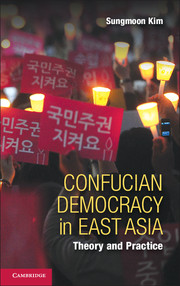Introduction
Toward Confucian Democratic Theory
Published online by Cambridge University Press: 05 June 2014
Summary
The Plasticity of “Democracy” in the East Asian Political Discourse
One puzzling phenomenon in modern political science and political theory is that as democracy has become ubiquitous in many parts of the world and democratic values have become increasingly accepted as universal human values, the term “democracy” has become almost a cliché, losing its definitional political meaning. This is especially so among East Asians who have yet to establish (full) democracy, despite their strong desire for it, and those who have attained it only recently through bloody fights against authoritarian forces. On one extreme, democracy means everything good: political stability, economic development, quality of life, full protection of individual human rights, maximal respect of diversity, and so on. On the other extreme, democracy is associated with the detriments that Western liberal democracies are currently struggling with, such as unbridled egoism, consumerism, erosion of the common good, and social anomie – all of which might ultimately contribute to high divorce rates, dysfunctional families, juvenile violence, and so on.
For those who are in the first extreme, democratic struggle aims primarily to “remedy evils experienced in consequence of [existing or] prior political institutions.” Thus understood, democracy not only is compatible with but also can provide optimal political and societal conditions for a market economy, rights-based individualism, value pluralism (or cultural pluralism), a vibrant civil society, and social justice. In a democracy, the argument goes, we can have all these goods simultaneously and without any internal contradictions, if we, the citizens, so will it; if any of these goods are missing or if there is any tension between these goods in our putatively democratic system, quite simply our democracy has not reached its pinnacle, or in political scientific language, our democracy has not yet been consolidated. Originally conceived negatively as the absence of evils, therefore, democracy in this understanding turns out to be “democratic faith,” an optimistic belief in the omnipotence of democracy.
- Type
- Chapter
- Information
- Confucian Democracy in East AsiaTheory and Practice, pp. 1 - 24Publisher: Cambridge University PressPrint publication year: 2014



